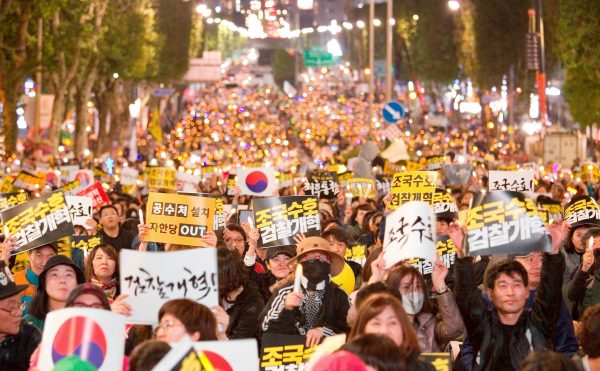August 2020 marks a year since the issue of prosecution reform erupted. People were enraged and indignant when the prosecutor’s office and the minority conservative party attempted to block a reform that had the approval of the National Assembly and the President. It was an affront to the country’s democracy.
The obstruction effort was galvanised by a scandal around the nominee for justice minister. In August 2019, South Korean President Moon Jae-in nominated Seoul National University law professor Cho Kuk, who was serving in another position in Moon’s administration, to head the Justice Ministry. Cho’s priority was to oversee reform of the prosecution.
Prosecution reform was near the top of President Moon’s agenda when he came to power in 2017. The scandal that brought down his predecessor, Park Geun-hye, alerted the country to problems with the prosecution. The prosecution was perceived as too close to business interests, with that proximity making prosecutors reluctant to investigate Park’s associates. South Korea’s prosecution also has wide-ranging powers — including to order investigations, carry out investigations and indict.
The candlelight movement of 2016–17, which culminated in Park’s impeachment, helped mobilise public sentiment behind the project of addressing unjust use of authority. A component of prosecution reform is the establishment of an office for investigating high-level corruption. This body would help monitor for the wrongdoing committed under Park.
Another aspect of reform is to allocate a portion of the prosecution’s authority to the police. The distribution of roles more evenly across agencies would prevent the prosecutor’s office from being able to act unilaterally. This would diminish bias in favour of the business conglomerates or other powerful groups.
The prosecutor’s office — reluctant to see its powers diminished — pushed back against the reform. It initiated an investigation into justice minister nominee Cho.
The prosecutor’s office accused Cho’s daughter and wife of involvement in fraud. His daughter was portrayed as having gained from her father’s status — in other words, that Cho Kuk represented the problem of entrenched privilege rather than the fight against it. The conservative party, citing the alleged scandal, refused to grant a nomination hearing to Cho.
Cho was eventually appointed but the investigation into his family continued.
The ‘Cho Kuk incident’, as news agencies called it, became a media storm and the centre of public discussion. As time passed without evidence being presented, the script came to feel familiar to many South Koreans. The sense that there was a challenge to the mission of the candlelight movement drove people out onto the streets to demonstrate against the obstruction.
Some say that Cho Kuk ‘divided’ South Korean society. While a vocal minority expressed opposition to prosecution reform, different opinions are to be expected in a plural society. Protests against prosecution reform came from the far right — who bring South Korean flags, US flags and Christian crosses to rallies — but their presence does not indicate deep divisions in society. Fostering the appearance of division was precisely the strategy of those who attempted to block prosecution reform.
Cho Kuk stepped down six weeks into his job as justice minister. He did not admit wrongdoing but the pressure on his family was too much. Popular support for Cho and prosecution reform continued. His successor, senior legislator Choo Mi-ae, picked up where he left off.
Justice Minister Choo, a former judge, has the legal and political credentials to carry out the reforms. She has won five elections in her district and is known for her fearlessness in taking positions even when they depart from her colleagues. Her task now is to shake off distractions from Yoon Seok-youl, head of the prosecutorial authority, and stay focused on seeing the reform through.
In December 2019, Cho was indicted. The next month, Seoul National University relieved Cho of his position. As of August 2020, none of the charges against Cho and his immediate family members have found support. The claims were easy to make without evidence and asserting them was sufficient to undermine Cho. The former justice minister has recently launched an effort to clear his name.
The persecution of Cho — the injustice of which is underscored by the demonstrations — should be extremely worrying to South Korea’s democratic allies. Those protestors waving US flags are profoundly anti-democratic — even if they appropriate the symbols and styles of democracy.
In April 2020, President Moon’s party swept into the majority in the National Assembly. The government’s response to the coronavirus pandemic was a factor but the prosecution reform episode alienated many South Koreans from the conservative groups.
Reform of the prosecution is fully underway. Even as elements continue to attempt to obstruct change, the people have stood up against the counter-revolution.
Erik Mobrand is Associate Professor of Korean Studies at the Graduate School of International Studies, Seoul National University. He is the author of ‘Top-Down Democracy in South Korea’ (University of Washington Press, 2019).


This is a one-sided perspective on the events. I grant that there are serious problems with the conservative opposition, but your article is nothing but an unfounded, conspiracy-minded narrative that the prosecution in South Korea is some kind of Deep State that investigated minister Cho only because it wanted to obstruct the prosecution reform. Have you not heard of ad hominem? The idea that you should attack the argument instead of attacking the motives of those who make the argument?